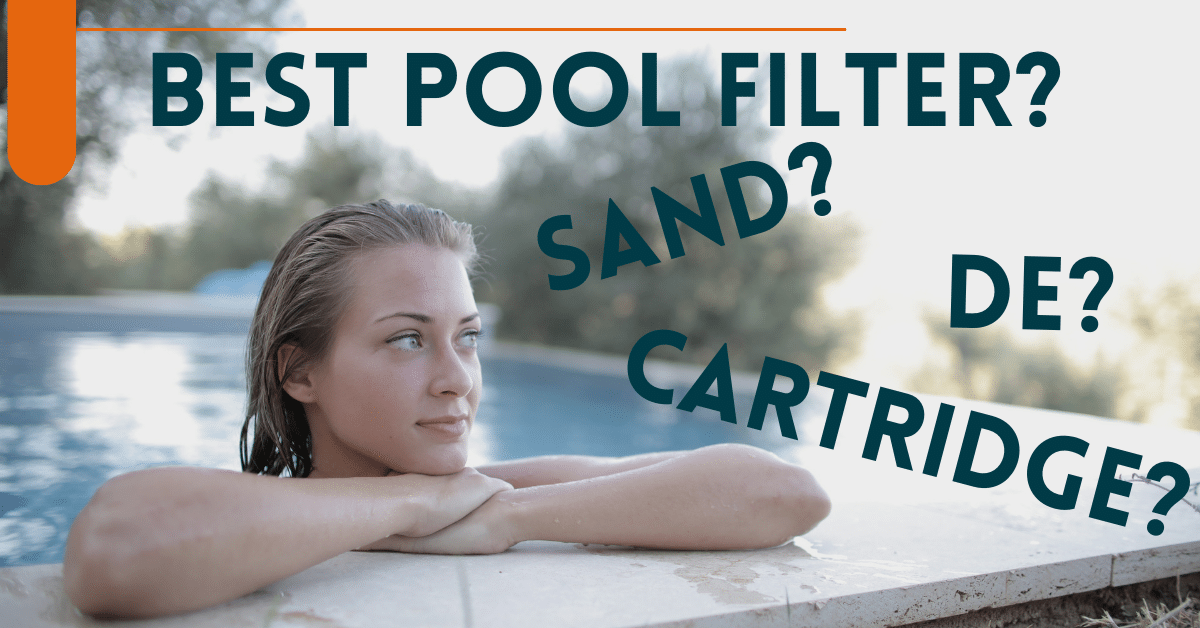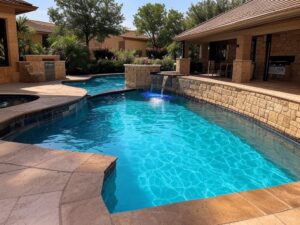Clear Impressions: Understanding the Different Kinds of Pool Filters
At Clear Impressions, we believe that every pool owner should have the clearest and cleanest water possible. An essential part of achieving this is by selecting the right pool filter for each application. The type of pool filter you choose can make a significant difference in the clarity, cleanliness, and health of your pool water. To help you make an informed decision, we’ve broken down the most popular pool filter types and their pros and cons.
1. Sand Filters
How They Work: Sand filters can use a special type of sand known as #20 silica sand, or a crushed glass media. When water passes through the sand, debris and contaminants are trapped in the tiny spaces between the sand particles. Sand filters with glass media can trap particles as small as 5 microns, which makes it a direct competitor with D.E. filtration and much better than cartridges, listed below.
Pros:
- Easy Maintenance: Backwashing (reversing the flow of water to clean out the dirt) is a simple process.
- Cost-effective: Sand filters and the sand itself are relatively inexpensive.
- Long-lasting: The sand usually needs to be replaced every 5-7 years, or up to 15 years with glass media!
- Optimal Filtration: Sand filters with glass media offer better filtration and flow rates than any other filter type.
Cons:
- Less Efficient: Sand filters can trap particles down to 20-40 microns. Some smaller particles can pass through.
- Frequent Backwashing: This can lead to water wastage and may not be allowed in your area.
2. Cartridge Filters
How They Work: Cartridge filters have a cylindrical cartridge made of pleated polyester. Water passes through this material, and debris gets trapped.
Pros:
- Less Water Wastage: They don’t require backwashing. You simply remove and clean the cartridge.
- Compact Size: Ideal for smaller pools or spaces.
Cons:
- More Frequent Cleaning: Especially during peak pool usage.
- Replacement Costs: While cartridges can last up to 3 years, they are much pricier to replace than sand.
- Less Efficiency: Cartridge filters can only trap particles as small as 10-20 microns.
3. Diatomaceous Earth (DE) Filters
How They Work: DE filters use a powdered natural substance called diatomaceous earth. This coats a series of grids or fingers inside the filter. The DE captures debris, trapping even the tiniest of particles.
Pros:
- Superior Filtration: DE filters can trap particles as small as 5 microns.
- Clearer Water: Often preferred by pool owners for the exceptional water clarity they provide when compared to silica sand or cartridge filters.
Cons:
- More Maintenance: Requires periodic backwashing and DE powder replenishment.
- Environmental Concerns: Used DE must be disposed of properly as it can’t be released into the natural environment.
- Health Concerns: DE is a known carcinogen. Under no circumstances should you breathe this incredibly fine powder.
4. Saltwater Generators
Note: While it isn’t a filter, saltwater generators are worth mentioning because they are sometimes used in conjunction with filters for pool sanitation.
How They Work: Saltwater pools use a generator to convert salt into chlorine, which acts as a disinfectant. In other words, all pools are chlorine pools. The only difference is how they get their chlorine into the water!
Pros:
- Soft Water: Saltwater feels softer on the skin.
Cons:
- Upfront Costs: The initial installation of a saltwater system can be costly.
- Maintenance: Salt cells in the generator need to be cleaned regularly to prevent calcium buildup.
Conclusion:
Selecting the right pool filter (or combination) depends on your priorities, location, and budget. Whether you value superior water clarity, maintenance ease, or environmental considerations, there’s a pool filter and sanitation system for you. At Clear Impressions, we’re always here to help you navigate these decisions and find the perfect match for your pool needs. If you have any questions about your pool filter, don’t hesitate to reach out! Dive into clear, clean water with confidence!
To learn more about our extensive and diverse offerings – from weekly service to our uniquely premium all-inclusive poolcare packages – feel free to contact us anytime by call or text: 682.204.9898
If you would like more helpful information about your pool, check our blog for more posts or you can listen to Pool Guy Podcast here.




